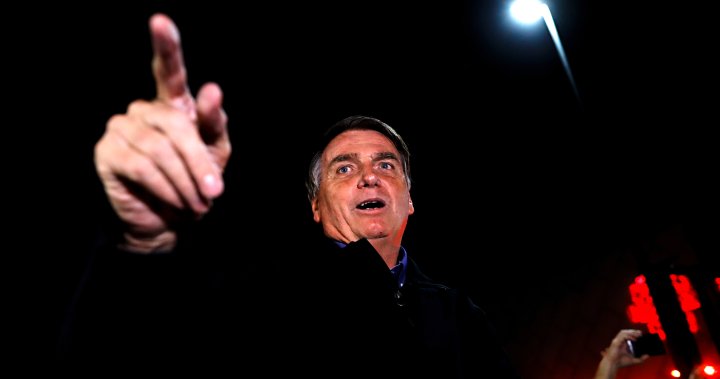
Another Jan. 6? Bolsonaro attacks Brazil’s election, raising fears of violence
Global News
Brazilians head to the polls on Sunday, and the right-wing leader is expected to lose to former president Luiz Inácio Lula da Silva, which Bolsonaro has said he won't accept.
Brazilians head to the polls on Sunday for a first round of voting that could mark the beginning of the end for Brazilian President Jair Bolsonaro — and experts are growing increasingly concerned he won’t go without a fight.
The right-wing firebrand is expected to lose to popular leftist former president Luiz Inácio Lula da Silva, widely known as Lula, in the first round. If no candidate wins more than 50 per cent of the vote, a runoff set for Oct. 30 is likely to further solidify da Silva’s victory.
But Bolsonaro, who has trailed in the polls throughout the campaign, has indicated he will not accept this outcome, telling his millions of supporters in June they “will go to war” if he loses. He has also repeatedly attacked the country’s election system, claiming without evidence that officials are aligned against him and that electronic voting machines are prone to fraud.
On Wednesday, Bolsonaro’s party released a document alleging officials within the government have the “absolute power to manipulate election results without leaving a trace.” The claim was not backed by evidence and was called “false and dishonest” by the national electoral authority.
The document’s release, which is now under investigation by Brazil’s Supreme Court, marks the latest escalation in an already violent campaign. Several Lula supporters and at least one Bolsonaro backer have been killed in recent months.
Experts say Bolsonaro’s rhetoric threatens to incite Brazil’s own version of the Jan. 6, 2021, attack on the U.S. Capitol by supporters of then-president Donald Trump, who were also led to believe in a “stolen” election despite no evidence.
“The fear is two-fold: what will Bolsonaro do as leader of the government, of the military, but also what will his supporters do on a societal level?” said Manuel Balan, a professor of political science at McGill University who studies Latin America.
Elected in 2018, Bolsonaro has divided the public over his conservative agenda, which has done little to raise millions out of poverty as he promised while also attracting negative attention for sexist and racist comments.

 Run 3 Space | Play Space Running Game
Run 3 Space | Play Space Running Game
 Traffic Jam 3D | Online Racing Game
Traffic Jam 3D | Online Racing Game
 Duck Hunt | Play Old Classic Game
Duck Hunt | Play Old Classic Game

















